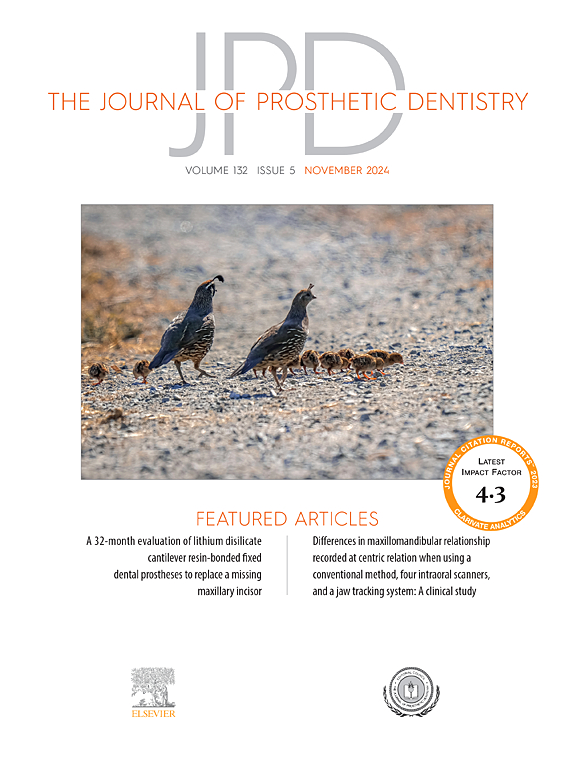比较两种用于最终修复的 3D 打印复合树脂的机械和表面特性。
IF 4.3
2区 医学
Q1 DENTISTRY, ORAL SURGERY & MEDICINE
引用次数: 0
摘要
问题陈述:增材制造(AM)技术正在成为牙科领域的一种创新方法。目的:本体外研究的目的是评估和比较人工老化后用于最终修复的两种市售 3D-CR 的机械和表面特性:Saremco print Crowntec; Saremco Dental AG 和 Varseo Smile Crown Plus; Bego GmbH 的打印层厚度为 50 µm,打印角度为 90 度。每种材料共制作了 20 个棒状试样(25×2×2 毫米),使用三点弯曲试验测量抗弯强度 (σf) 和弹性模量 (E),每种材料还制作了 5 个盘状试样(直径 15×3 毫米),使用显微硬度试验测量表面显微硬度。一半试样在干燥条件下进行测试,另一半试样在蒸馏水中浸泡 30 天。每种材料都有 5 个圆盘状试样(直径 15×3 毫米),用于评估模拟刷牙前后的表面粗糙度。此外,5 个圆盘状试样(直径 15×1 毫米)用于评估 28 天内的吸水性(wsp)和溶解性(wsl)。统计分析采用功率为 90% 的 Wilcoxon 配对符号秩检验(单尾)(α=.05):Saremco Print Crowntec 和 Varseo Smile Crown Plus 的平均±标准偏差抗折强度值分别为 123.4 ±8.7 MPa 和 109.9 ±15.8 MPa。老化后,Saremco print Crowntec 的强度值为 97.5 ±15.2 MPa,Varseo Smile Crown Plus 的强度值为 94.2 ±11.7 MPa。Saremco print Crowntec 和 Varseo Smile Crown Plus 的平均维氏硬度值分别为 33.2 ±0.8 N/mm2 和 31.5 ±0.6 N/mm2。老化后,Saremco print Crowntec 的平均值为 31.7 ±0.9 N/mm2,Varseo Smile Crown Plus 的平均值为 29.6 ±1.0 N/mm2。Saremco print Crowntec 和 Varseo Smile Crown Plus 的平均弹性模量分别为 4.2 ±0.3 GPa 和 3.82 ±0.2 GPa。21 天后,Saremco print Crowntec 的平均吸附值为 11.52 ±0.6 mg/mm3,Varseo Smile Crown Plus 为 12.43 ±0.4 mg/mm3。28 天后,Saremco print Crowntec 和 Varseo Smile Crown Plus 的平均溶解度分别为 1.36 ±0.4 mg/mm3 和 0.98 ±0.3 mg/mm3。两种 3D-CR 在干燥状态下的抗弯强度(P=.03)、浸水 30 天后的杨氏模量(P=.023)以及干燥状态下的维氏硬度(P=.01)和浸水 30 天后的维氏硬度(P=.018)方面存在显著差异:结论:两种 3D-CR 都具有良好的体外性能和长期临床应用所需的机械性能。人工老化降低了两种 3D-CR 的抗弯强度。本文章由计算机程序翻译,如有差异,请以英文原文为准。
Comparison of mechanical and surface properties of two 3D printed composite resins for definitive restoration
Statement of problem
Additive manufacturing (AM) technology is emerging as an innovative approach in the dental field. In recent years, manufacturers have introduced 3-dimensionally printed composite resins (3D-CRs) that are specifically designed for the AM of definitive prostheses; however, the mechanical and surface properties of these materials require investigation.
Purpose
The purpose of this in vitro study was to assess and compare the mechanical and surface properties of 2 commercially available 3D-CRs for definitive restoration after artificial aging.
Material and methods
Saremco print Crowntec; Saremco Dental AG and Varseo Smile Crown Plus; Bego GmbH were printed with a layer thickness of 50 µm at a 90-degree angle. A total of 20 bar-shaped specimens (25×2×2 mm) were produced from each material to measure the flexural strength (σf) and elastic modulus (E) using a 3-point bend test, and 5 disk-shaped specimens (Ø15×3 mm) from each material were used to measure the surface microhardness using a microhardness test. Half of the specimens were tested under dry conditions, while the other half were immersed in distilled water for 30 days. Five disk-shaped specimens (Ø15×3 mm) from each material were used to evaluate surface roughness before and after undergoing toothbrushing simulations. Additionally, 5 disk-shaped specimens (Ø15×1 mm) were used to assess water sorption (wsp) and solubility (wsl) over 28 days. Statistical analyses were conducted using the Wilcoxon matched-pairs signed-rank test (1-tailed) with 90% power (α=.05).
Results
The mean ±standard deviation flexural strength values were 123.4 ±8.7 MPa for Saremco print Crowntec and 109.9 ±15.8 MPa for Varseo Smile Crown Plus. After aging, these values were 97.5 ±15.2 MPa for Saremco print Crowntec and 94.2 ±11.7 MPa for Varseo Smile Crown Plus. The mean Vickers hardness values were 33.2 ±0.8 N/mm2 for Saremco print Crowntec and 31.5 ±0.6 N/mm2 for Varseo Smile Crown Plus. After aging, the mean values were 31.7 ±0.9 N/mm2 for Saremco print Crowntec and 29.6 ±1.0 N/mm2 for Varseo Smile Crown Plus. The mean modulus of elasticity was 4.2 ±0.3 GPa for Saremco print Crowntec and 3.82 ±0.2 GPa for Varseo Smile Crown Plus. After 21 days, the mean sorption values were 11.52 ±0.6 mg/mm3 for Saremco print Crowntec and 12.43 ±0.4 mg/mm3 for Varseo Smile Crown Plus. After 28 days, the mean solubility values were 1.36 ±0.4 mg/mm3 for Saremco print Crowntec and 0.98 ±0.3 mg/mm3 for Varseo Smile Crown Plus. Significant differences were found between the 2 3D-CRs in flexural strength in the dry state (P=.03), in Young modulus after 30 days of water immersion (P=.023), and in Vickers hardness in the dry state (P=.01) and after 30 days of water immersion (P=.018).
Conclusions
Both 3D-CRs provided good in vitro performance and the mechanical properties required for long-term clinical application. Artificial aging decreased the flexural strength of both 3D-CRs.
求助全文
通过发布文献求助,成功后即可免费获取论文全文。
去求助
来源期刊

Journal of Prosthetic Dentistry
医学-牙科与口腔外科
CiteScore
7.00
自引率
13.00%
发文量
599
审稿时长
69 days
期刊介绍:
The Journal of Prosthetic Dentistry is the leading professional journal devoted exclusively to prosthetic and restorative dentistry. The Journal is the official publication for 24 leading U.S. international prosthodontic organizations. The monthly publication features timely, original peer-reviewed articles on the newest techniques, dental materials, and research findings. The Journal serves prosthodontists and dentists in advanced practice, and features color photos that illustrate many step-by-step procedures. The Journal of Prosthetic Dentistry is included in Index Medicus and CINAHL.
 求助内容:
求助内容: 应助结果提醒方式:
应助结果提醒方式:


